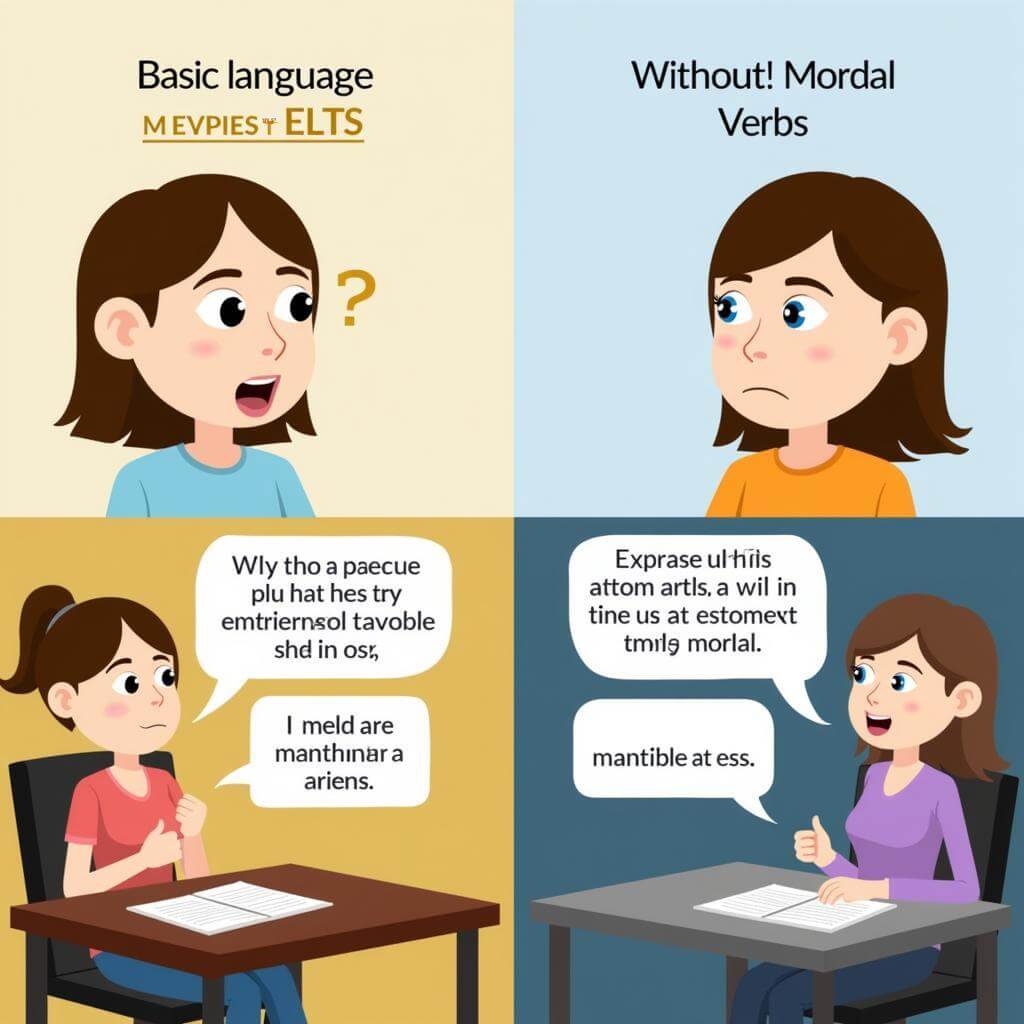Modal verbs are essential tools for expressing ideas with nuance and precision in English. For IELTS candidates, mastering these versatile verbs can significantly enhance speaking fluency and overall performance. This guide will explore effective strategies for using modal verbs to improve your IELTS Speaking score.
Understanding Modal Verbs in IELTS Context
Modal verbs such as ‘can’, ‘could’, ‘may’, ‘might’, ‘will’, ‘would’, ‘should’, and ‘must’ play a crucial role in expressing possibility, ability, permission, and obligation. In IELTS Speaking, these verbs can help you convey your thoughts more accurately and demonstrate a higher level of language proficiency.
The Power of Modals in IELTS Responses
Using modal verbs effectively can:
- Add sophistication to your answers
- Express degrees of certainty
- Show politeness and tact
- Demonstrate a range of language functions
Using modals in speaking answers can significantly improve your ability to express complex ideas and hypothetical situations, which are often required in IELTS Speaking Part 3.
Strategies for Incorporating Modal Verbs
- Practice with hypothetical situations
- Use modals to express different levels of certainty
- Combine modals with perfect infinitives for past speculation
- Employ modals for polite requests and suggestions
Expressing Possibility and Probability
When discussing potential scenarios or making predictions, modal verbs are invaluable. Consider these examples:
- “The government might implement new policies to address climate change.”
- “This approach could lead to significant improvements in public health.”
By using ‘might’ and ‘could’, you demonstrate your ability to discuss possibilities without making absolute statements.
Showing Ability and Potential
Modal verbs are excellent for describing capabilities:
- “With proper training, I believe I can achieve a high score in IELTS.”
- “Technology could potentially solve many of our current environmental issues.”
These sentences showcase your ability to discuss personal and general capabilities, a key aspect of IELTS Speaking.

Advanced Modal Verb Techniques
To truly excel in IELTS Speaking, consider these advanced techniques:
Combining Modals with Perfect Infinitives
This structure allows you to speculate about past events:
- “The traffic must have been terrible; that’s why he’s late.”
- “She could have misunderstood the instructions.”
Using these complex structures demonstrates a high level of grammatical control, which is crucial for achieving a band 7 or above in IELTS Speaking.
Conditional Structures with Modals
Incorporating modals into conditional sentences can significantly enhance your responses:
- “If I were the mayor, I would implement more green spaces in the city.”
- “Had I known about the importance of IELTS earlier, I could have started preparing sooner.”
Were I in charge, I would make changes is an excellent example of how to use inverted conditionals with modals, showcasing advanced language skills.
Expressing Regrets and Wishes
Modal verbs are perfect for discussing hypothetical situations and regrets:
- “I wish I could speak five languages fluently.”
- “If only I had more time, I would travel the world.”
If only I had more time, I would finish it provides more examples of how to use these structures effectively in IELTS Speaking.
Common Pitfalls and How to Avoid Them
While modal verbs can greatly enhance your speaking, be aware of these common mistakes:
- Overusing one modal verb
- Incorrect word order in questions
- Forgetting to use the base form of the verb after modals
- Misusing modals in reported speech
To avoid these issues, practice extensively and focus on mastering verb forms for accuracy.
Practicing Modal Verbs for IELTS Speaking
To improve your use of modal verbs, try these exercises:
- Role-play hypothetical situations
- Describe future plans and possibilities
- Give advice using ‘should’ and ‘ought to’
- Express degrees of certainty about current events
Remember, consistent practice is key to mastering modal verbs and improving your overall IELTS Speaking performance.
Expert Tips for IELTS Speaking Success
Dr. Emily Chen, an IELTS Speaking examiner with 15 years of experience, offers this advice:
“I always encourage candidates to use a variety of modal verbs naturally in their responses. It’s not about using complex structures for the sake of it, but about expressing your ideas clearly and precisely. Practice incorporating modals into your everyday English conversations, and you’ll find they come more easily during the test.”
By following these strategies and consistently practicing, you can significantly enhance your use of modal verbs, leading to improved fluency and a higher band score in IELTS Speaking.
Conclusion
Mastering modal verbs is a powerful way to enhance your IELTS Speaking performance. By incorporating these versatile verbs into your responses, you can express complex ideas with greater precision and demonstrate a higher level of English proficiency. Remember to practice regularly, vary your usage, and apply modal verbs in context. With dedication and the right approach, you can significantly improve your fluency and achieve the IELTS Speaking score you desire.
To further improve your IELTS preparation, consider exploring strategies for better grammar usage and continue practicing with a variety of IELTS-style questions. Good luck with your IELTS journey!
FAQs
-
How many modal verbs should I use in my IELTS Speaking responses?
There’s no set number, but aim to use a variety naturally throughout your responses. Quality and appropriateness are more important than quantity. -
Can using modal verbs help me in other parts of the IELTS test?
Absolutely! Modal verbs are useful in IELTS Writing, especially for Task 2 essays where you need to discuss possibilities and give opinions. -
What’s the difference between ‘could’, ‘may’, and ‘might’ in terms of possibility?
‘Could’ suggests general possibility, ‘may’ implies a higher likelihood, and ‘might’ indicates a slightly lower probability. -
How can I practice using modal verbs in everyday conversations?
Try giving advice to friends, discussing future plans, or speculating about current events using modal verbs. -
Are there any modal verbs I should avoid in formal IELTS Speaking?
While all modal verbs have their place, be cautious with very informal uses like ‘gotta’ or ‘wanna’, which are contractions of ‘got to’ and ‘want to’.